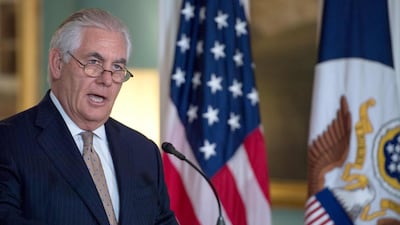When Donald Trump tweeted unmistakably strong support for the Arab coalition confronting Qatar, the final window of hope slammed shut on Doha. Qatar’s only practical way out of the crisis was hope that Washington would mediate the crisis in a spirit of strict neutrality and press all sides to return to the status quo ante. That’s clearly not happening
Some voices in Washington did suggest such an approach, arguing that the United States should avoid any involvement in a “spat” between allies and that US military interests in Qatar overrule all other considerations. This perspective – which is informed mainly by narrow or ill-informed understandings and fails to appreciate the effect of Qatar’s conduct on regional affairs – has not prevailed. A more cautious and circumspect approach rather than blustering, self-congratulatory presidential tweets would certainly have been preferable. But the US clearly understands it has a major stake in the outcome.
Secretary of state Rex Tillerson struck a more subtle tone. He demanded that Qatar “must do more and ... more quickly” to end support and financing of terrorism, while calling on Arab states to “ease the blockade against Qatar”.
Note that this apparently even-handed approach actually asks Qatar to change its behaviour while urging the others to move back to towards business as usual. Therefore, whether phrased bluntly or more subtly, the American position is clearly siding firmly with the Arab bloc and against Qatar.
Even more ominously for Doha, the Trump administration has asked Saudi Arabia for a list of specific demands on Qatar to restore former relations.
This confirms that Washington wants to resolve the dispute but realises that this cannot involve a repetition of the 2014 rupture wherein Qatar promised to change its behaviour but, after a period of relative caution, backslid and resumed its support of political and religious radicals and double-dealing on Iran.
Qatar is defiant and putting on a brave face. But the reality is that it is surrounded by outraged neighbours, partners and nominal allies. The travel, trade and communications embargoes that have been imposed, especially by Saudi Arabia, which effectively controls Qatar’s only land border, will be increasingly crippling. Moreover, sanctions are widening and intensifying, and more Arab countries are joining the camp that is downgrading relations with Qatar until it mends its ways.
Turkey is giving Qatar considerable diplomatic and rhetorical support, and speeding up some limited and hardly game-changing military cooperation. But the reality is that Ankara is not able to provide Qatar with the breadth and depth of support the tiny country needs, especially over the long run.
Nor can Turkey project enough power at such distances to become the new Qatari patron and guarantor of its prerogatives over the vehement objections and opposition of its immediate Arab neighbours.
Much as both Ankara and Doha might want this, the idea of Qatar becoming a client of Turkey is neither realistic nor viable.
Iran, too, is offering a wide range of support to Qatar. Tehran is clearly relishing the discord in the Arab camp and fanning the flames as energetically as possible. Unlike Turkey’s offers, though, Qatar is largely rebuffing Iran, at least in public. But more quietly Doha certainly seems to be moving ever closer to Tehran, both confirming some of the main charges against it and deepening the rift with Arab countries and Washington.
Iran’s support is theoretically more realistic than Turkey’s, given its geographical proximity to Qatar, but politically it is far more non-viable. Indeed, any overt or substantive steps by Doha to decisively align with Tehran would be a catastrophic error. It could lead to suspension or expulsion from the Gulf Cooperation Council, American moves to shift its military presence in Qatar to a neighbouring country, and might even destabilise the Qatari regime itself.
Doha knows all this full well and therefore must keep Iran at arm’s length in public even if it moves closer to it in quieter ways during the crisis. And it’s almost certain that Qatar will have to reverse any moves towards Tehran – and then shift further away from it than it has been in the past decade or more – if it wants to find a way out of the crisis it has created for itself.
Not only does Qatar lack any viable options, especially now that Washington has plainly sided against it, the crisis for Doha is just beginning. If this drags on for months, the country’s economy will be severely damaged, its regional role all but eliminated, and many of its plans – possibly including hosting the World Cup – either disrupted or rendered impossible.
Qatar may drag this out to share the pain, but it knows it is going to have to capitulate eventually. And just as it is openly working with Turkey and quietly with Iran to maximise its options and minimise the damage it sustains during the confrontation, it is simultaneously now taking steps to reach out and seek a resolution.
Qatar also knows that it cannot end the crisis without agreeing to a series of measures the Arab bloc is demanding, especially insofar as they are also insisted on by Washington. Doha is therefore visibly moving towards negotiating the terms of its coming inevitable climb down, and limiting the price it must pay. Doha cannot endure current circumstances, let alone an additional significant escalation. Qatar has no choice.
Hussein Ibish is a senior resident scholar at the Arab Gulf States Institute in Washington
On Twitter: @ibishblog


